— ii
��*' ii
��256
��HISTORY OF RICHLAND COUNTY.
��As the music died away in the grand arches of the wildwood cathedral, the poor woman cried aloud from the great burden of unrest that filled her poor soul, and she sank upon her knees and wept out her first praj'ei*. She wanted to walk in the light, to know the jo}' of a soul redeemed, to share in the blessedness with those who love the Lord, and, loving Him, find peace. Religious meetings were held in groves and barns and beside woodland springs, and the hospitality of Christian people was heavily taxed, but the}' were never cognizant of the fact. They enjo3'ed it ; they longed for it ; they were the gladdest when the lirethren lay crowded in a great "field-bed." on the floor, so crowded that perhaps the host and hostess had to sleep sitting with their backs against the jambs all night, each holding a restless, slumbering child, while the sisters lay in the "loft." on the loose, clattering clapboards. What must the few remaining pioneers think of nowadays, when the mistress of the house keeps a caller waiting while she arranges her clothing or the dear bangs on her prett}- fore- head !
The early pioneers in Richland Count}' came from Virginia, Maryland, Pennsylvania, New York and the New England States. Many of them were poor, and, like Jack in the story, "came to seek their fortunes." A few came with ox teams ; some with horses, two, three or four of them ; some in two-wheeled carts, while others packed all their worldly possessions on a couple of old critters." Instances are re- lated of a bag on top, or snugged down in among the bundles, made somewhat after the fashion of a double knapsack, and a couple of babies poked their little bronzed faces out of the slits in this novel conveyance, and rode along like little "possums." The grandfathers will tell how knapsacks were made, if the unin- itiated will inquire, and they will tell how, with their own white-muslin knapsacks slung upon their shoulders, they went back to visit the
��old homes of their early boyhood, with hearts aching and sorrowing, and hungiy to look upon the beloved scenery that was so indelibly stamped in their memories. This they did, ten or twenty years afterward, on foot, staff in hand, like pilgrims going to Mecca.
From fifteen to fifty-five da^^s were required in making the toilsome journey to the Far West, by the first pioneers. Streams had to be forded frequently. It was not unusual for a team to give out on the way and cause a delay of a fortnight or a month to one of the fami- lies. The joy was very great when the team hove in sight and the family rejoined the party who had found "the end of the road," or stopped until the men looked for a suitable lo- cation. The nois}^ joy of Paddy in America, meeting Micky, fresh from Ireland, would be a suitable comparison to the welcome given to the new arrival.
The Sabbath day was observed in very early times by the pioneer families. Thej' met at the largest cabin, some one read a sermon, and the}' had prayer and singing. Whenever a preacher came, an appointment was made and word sent out to all the fiilnilies for many miles around.
The first marriages were solemnized by " Par- son Scott," a minister living near Mount Ver- non. They were conducted as became the solem- nity of the occasion. There was no fun, no " run- ning after the liottle," and no undue or rude merriment at weddings in one part of the county, at least. An incident connected with one of the first deaths, in 1812, is touching. It was agreed upon that if the sick man was in danger of. death before morning, the musket was to be fired off. Just after midnight the re- port of the gun was heard, its echo reverber- ated among the hilltops until the ominous sound died mournfully away. Men sprang from their humble beds, hardly waiting to clothe themselves entirely, hurried through the thicket path, crossed the creek in the canoe, and when
��s) "5* '
�� �
